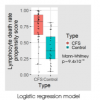Sorry to be going on a bit, but I feel a bit hopeful about this team's work. They have the best opening sentence in an ME/CFS paper that I have seen, I think.
Myalgic Encephalomyelitis/Chronic Fatigue Syndrome (ME/CFS) is a devastating illness whose biomedical basis is now beginning to be elucidated.
There is quite a bit in the discussion that is interesting.
They say that it would be useful to compare the viability of frozen lymphocytes with other diseases.
It has been documented previously that frozen PBMC viability is also reduced in paediatric Dengue fever
But they think the Step 2 Seahorse tests would differentiate ME/CFS from the rest.
To be confused with ME/CFS in the confirmatory tests of mitochondrial respiratory function and TORC1 activity, other illnesses would not only need to cause reduced viability of frozen lymphocytes, they would also need to confer upon the derived lymphoblasts the same pattern of molecular abnormalities – decreased Complex V efficiency, elevated proton leak as a proportion of basal metabolic rate, as well as increases in maximum respiratory capacity, Complex I activity, nonmitochondrial oxygen consumption and TORC1 activity.
They note that lymphoblasts from Parkinson's patients look quite different to those of ME/CFS in these tests.
They discuss why the ME/CFS thawed lymphocytes might be dying quicker. They say it could be due to the poorer mitochondrial function:
Impaired mitochondrial respiratory function, including Complex V impairment, has long been known to result in apoptotic cell death in ex vivo lymphoid cells [45]. However, we have not demonstrated that the lymphocyte death we observe is apoptotic or whether it is one of the other known forms of eukaryotic cell death.
They say that whatever the cell death pathway is, it may reflect the inability of the cells to respond normally to cell damage or stress (in this case freezing). They note that freezing causes damage, but also has been documented to affect PBMC expression of stress response genes.
They noted this:
Compared with controls, the number of dead ME/CFS lymphocytes continued to increase at a faster rate than the controls over multiple days in
culture. This suggests that underlying and ongoing cytopathological processes could be contributing towards cell death in culture of previously frozen lymphocytes.
I'm not sure what they have in mind. But they seem to be suggesting that there could be something pathological going on not directly related to the freezing. I wonder what the death rate is in ME/CFS lymphocytes that aren't frozen.
Anyway, thanks to Daniel and the team for remaining interested in ME/CFS and their good work. And the funders, including the Mason Foundation which I have given a bit of a hard time previously for some of their funding choices.
I look forward to replication of the work by this team and others. I note that the team in Otago have had some trouble getting consistent differences between people with ME/CFS and controls in the Seahorse studies; they thought they had some technical issues to sort out.



